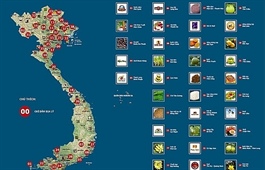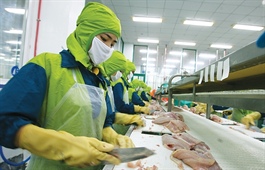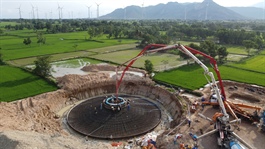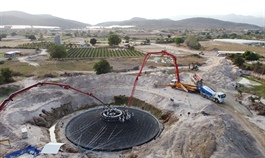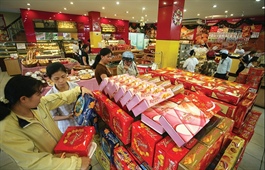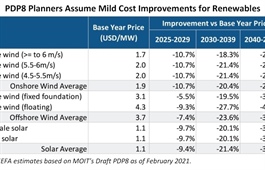Authorities cracking down on agricultural pretenders
Authorities cracking down on agricultural pretenders
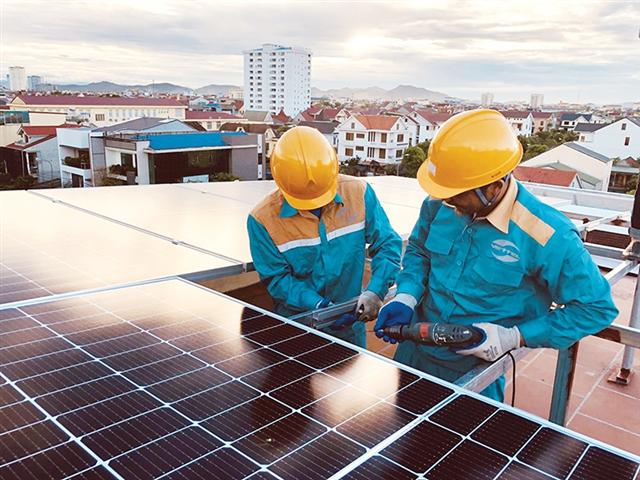
Some groups have pointed out that they needed to prioritise solar installation to avail of tariff rates, rather than focus on the agricultural side. Photo: Le Toan
|
Gia Lai Department of Industry and Trade (DoIT) has reviewed and reported that 173 of 441 solar power projects in the Central Highlands province have violated rooftop solar power regulations but still enjoyed the incentivised feed-in tariff (FiT).
Pham Van Binh, director general of the DoIT, said that these projects have not developed any building or agricultural production under the panels, wasting the true potential of some land plots.
The offending solar projects have been set up in the guise of agricultural farms and “bypassing” procedures by applying in-principle approval at commune level and requesting for changing land-use purpose at district level. However, after these procedures for businesses were approved, post-checking has yet to be carried out frequently.
Regarding handling of the violations, Binh said that the DoIT asked businesses to complete changing land-use purposes as well as develop agricultural farms in accordance with the registered documents until the end of June. The department will report to Gia Lai People’s Committee to receive direction and guidance of the penalties for these violations.
“The local authorities will further tighten the management of such farms and land. The leaders of the province will later conclude the responsibilities of the DoIT, district-level authorities, and sanctions for businesses,” Binh said.
This drastic move may place some pressure on developers such as Solar Tay Nguyen, Phu Manh Company, Thai Duong Gia Lai Agricultural Investment, and more. Solar Tay Nguyen’s agricultural activities involve chicken farms over hectares of land, Phu Manh produces mushrooms, and Thai Duong plants trees.
“The coverage of these agricultural projects makes up only 10-20 per cent of total area of the projects and generates tiny revenues – so they do not meet the requirement of solar power projects on agricultural land,” explained a DoIT representative.
In many districts across Gia Lai, solar farms without any planting or agricultural production under the panels is a common description of solar power projects which applied the FiT of rooftop solar power as per Decision No.13/2020/QD-TTg released in April 2020 on the mechanism of encouraging development of solar power in Vietnam.
Ho Minh Hau, head of the Infrastructural Economy Division at Chu Se People’s Committee, said that most solar power projects on agricultural farms in the district have yet to do planting or husbandry. “Agricultural production is mentioned on paper only, and in fact some projects are ‘disguised’ by some chickens, vegetables, and mushrooms, most of them gaining from solar power only and leaving the actual land useless,” said Hau.
Despite connecting to the national grid for a long time and enjoying a good FiT which was applied under Decision 13 a year ago, most of the solar power farms in Kte village of Chu Se district’s Hbong commune are filled only with weeds, in just one example. Many dozens of metal pillars are planted alongside to prop up corrugated iron roofs and the hundreds of solar panels above.
According to Decision 13, the FiT for solar power projects on agricultural farms is VND1,943 (0.08 US cents) per kWh, higher than other renewable power projects. However, Document No.7088/BCT-DL from the Ministry of Industry and Trade (MoIT) dated September 2020 on guiding investment into rooftop solar power stipulated that the solar panels of these projects should lay on a building or roof (in accordance with the Law on Construction 2014), which is operating in proper function and purpose.
However, in order to gain more profits, numerous businesses have tried to circumvent the law. “They feed some chickens only and tell the local authorities that animals have just died because of disease, or they have sold them. They don’t want to invest into husbandry or cultivation because the land and conditions here are quite difficult to do so, so the investment and risks will be high,” said Hau.
According to a recent report from the DoIT sent to Gia Lai People’s Committee, there are nearly 3,250 solar power projects in the province with a total installation capacity of 603.8MWp. The inspection team of the department has already checked 440 projects. Of these, 10 are on the rooftops of warehouses and factories and 430 on the roof of farms.
Over 250 of the 430 projects have been developing and operating agricultural farms under solar panels, although around 170 projects have yet to carry out any agricultural work.
Binh from the DoIT said, “As of July 15, if the investor of rooftop solar power projects do not fix the troubles related to lines and substations, as well as fire prevention and fighting, their contracts of purchasing power with Gia Lai Electricity Company will be halted, and specific sanctions will be applied.”
Explaining to the inspection team, some businesses have said that with the deadline to connect to the national grid to enjoy high prices as laid out in Decision 13 being December 31, 2020, agri-projects were forced to install rooftop solar panels first and develop the more traditional aspects of the farm later.
Thanks to policies promoting solar power development, within a single year the power load of Gia Lai has increased by 600MWp. Of this, numerous projects combined between solar farm and agricultural farm were registered to enjoy the FiT.
Gia Lai is one among numerous provinces hosting rooftop solar power projects that may be causing violations. Dak Lak, Bac Lieu, Binh Thuan, and Dak Nong provinces are also booming with rooftop solar power ventures, with ‘agricultural projects’ being listed on documents only but with no real agricultural operations in sight.
“The trouble in Gia Lai is also a common concern in rooftop solar power across the country, so details should be submitted to higher management levels like the MoIT to ask for new policies or sanctions for all,” Binh said.








